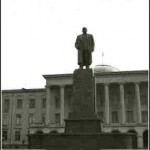Gori (Georgia). Stalin statue removed in dictator’s hometown.
25 Jun 2010 Georgian President Mikhail Saakashvili has approved the dismantling of the historic monument to Stalin in the centre of Gori, Soviet dictator’s birthplace, and rejected the accusations of attempting to rewrite history.
Georgian President Mikhail Saakashvili has approved the dismantling of the historic monument to Stalin in the centre of Gori, Soviet dictator’s birthplace, and rejected the accusations of attempting to rewrite history.
“There is a museum nearby. In that place there must be the appropriate exposure. In our country there should not be at the same time museums of occupation and monuments to people whose initiative provoked the invasion of an occupation army,” Mr. Saakashvili said, alluding to the military conflict with Russia in August 2008. “It’s necessary to act with history in a civilized manner, without hysterics and vandalism”, he concluded.
Stalin’s six-meter-bronze statue was removed during the night, so that in the morning the empty square in front of City Hall was a surprise to the townspeople. According to some of them, authorities simply tried to avoid protests, because local residents would prevent the demolition.
Officials say the overnight dismantlement of the towering statue, approved last week by the city’s parliament, was spurred by the appeals of a younger generation who have embraced Western ideals of freedom.
At a press conference the Minister of Culture, Sport and Monument Protection Nika Rurua said that “in the centre of the city of Gori, on Heroes’ Square, there is no place for such an ugly idol.”
“Stalin was a political criminal involved in the invasion of Georgia by the Red Army in 1921 and in its occupation which lasted 70 years,” he explained.
The removal of the monument to the Soviet dictator – erected in his honor in 1952, the year before his death, – makes way for the construction of a memorial to the fallen in the war against Russia in August 2008, when the town was shelled by Moscow’s military forces.
The huge statue of Stalin, in an overcoat staring out over the Caucasus Mountains beyond, was one of the few monuments to the dictator still standing anywhere in the world.
Born Joseph Dzhugashvili to a peasant woman in Gori (80 kilometres west of Tbilisi) in 1878, Stalin ruled the Soviet Union with an iron fist from the late 1920s to his death in 1953.
Article – Reuters – Georgia
- In: History Culture
Comment Form
Welcome
We are a group of long experienced European journalists and intellectuals interested in international politics and culture. We would like to exchange our opinion on new Europe and Russia.
Categories
- Breaking News (11)
- CIS (129)
- Climate (2)
- Energy&Economy (115)
- EU Eastern Dimension (85)
- Euro 2012 – Sochi 2014 – World Cup 2018, Sport (43)
- Euro-Integration (135)
- History Culture (198)
- International Policy (261)
- Military (74)
- Interviews (18)
- Italy – Italia – Suisse (47)
- Odd Enough (10)
- Poland and Baltic States (126)
- Religion (31)
- Russia (421)
- Survey (4)
- Turning points (4)
- Ukraine (176)
- Российские страницы (113)
Archives
- November 2020
- October 2020
- September 2020
- August 2020
- July 2020
- May 2020
- April 2020
- March 2020
- January 2020
- December 2019
- November 2019
- October 2019
- September 2019
- August 2019
- July 2019
- June 2019
- May 2019
- April 2019
- March 2019
- February 2019
- December 2018
- November 2018
- October 2018
- September 2018
- August 2018
- July 2018
- June 2018
- May 2018
- April 2018
- March 2018
- February 2018
- January 2018
- December 2017
- November 2017
- October 2017
- September 2017
- August 2017
- July 2017
- May 2017
- March 2017
- January 2017
- December 2016
- November 2016
- October 2016
- September 2016
- July 2016
- June 2016
- May 2016
- April 2016
- February 2016
- January 2016
- November 2015
- October 2015
- September 2015
- June 2015
- April 2015
- March 2015
- February 2015
- January 2015
- December 2014
- November 2014
- October 2014
- September 2014
- August 2014
- July 2014
- June 2014
- May 2014
- April 2014
- March 2014
- February 2014
- January 2014
- December 2013
- November 2013
- October 2013
- September 2013
- August 2013
- July 2013
- June 2013
- May 2013
- April 2013
- March 2013
- February 2013
- January 2013
- December 2012
- November 2012
- October 2012
- September 2012
- August 2012
- July 2012
- June 2012
- May 2012
- April 2012
- March 2012
- February 2012
- January 2012
- December 2011
- November 2011
- October 2011
- September 2011
- August 2011
- July 2011
- June 2011
- May 2011
- April 2011
- March 2011
- February 2011
- January 2011
- December 2010
- November 2010
- October 2010
- September 2010
- August 2010
- July 2010
- June 2010
- May 2010
- April 2010
- March 2010
- February 2010
- January 2010
- December 2009
- November 2009
- October 2009
- September 2009
- August 2009
Our books




